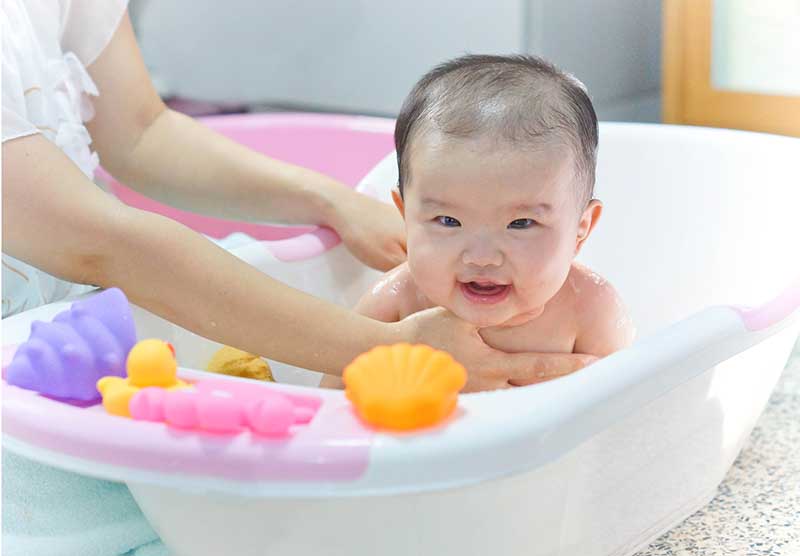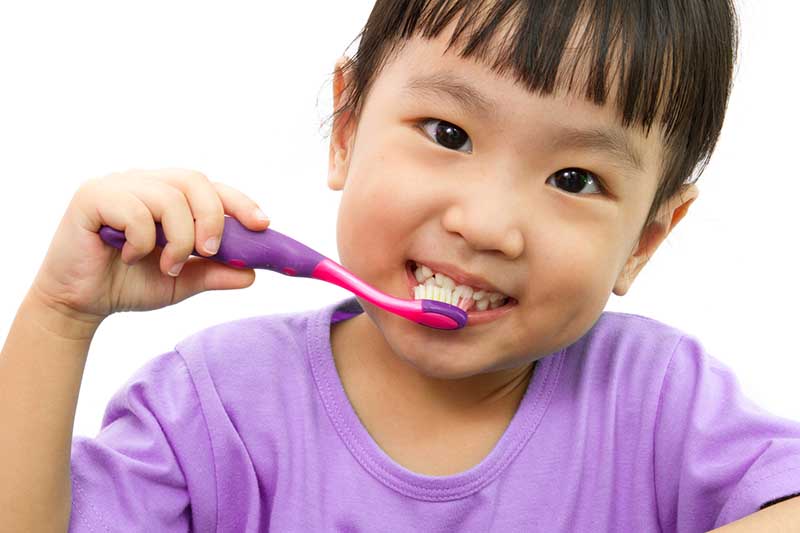Families For Life | Dental Care for School-Age Children-Toddlers

DID YOU KNOW?
Bath time is a good way to soothe your baby but it can also be a fantastic learning opportunity for your child. Learn how you can engage him during bath time.
READ MORE

Healthy teeth and gums are vital to your school-age child’s general health. Dental care for children’s teeth starts with cleaning your child’s teeth twice a day.
Teeth development
Baby teeth can arrive in any order, although the central bottom teeth are often first. Most children have a full set of 20 baby teeth by the time they’re three.
Adult teeth start developing inside babies’ jawbones after birth. After a baby tooth falls out, an adult permanent tooth takes its place.
Children usually start losing their baby teeth from around six years of age. From 6-12 years, children have a mixture of adult and baby teeth. The baby teeth at the back are replaced around 10-12 years of age. By this age, most children have all their adult teeth except for the third molars (wisdom teeth).
The adult teeth don’t get replaced, so you have to look after them.
If your child’s baby teeth came late, the adult teeth will probably be late too. If you’re concerned about your child’s teeth development, see your dentist.
When adult teeth are coming through
Your child might find chewing is more difficult when teeth are loose or missing, but your child still needs to eat healthy foods.
It’s important to keep up your child’s teeth-brushing routine, taking extra care around the loose teeth or sensitive areas. But let loose teeth fall out on their own. If you try to pull out a tooth before it’s ready to fall out, it can snap. This can cause pain and infection.
Sometimes an adult tooth will come through before the baby tooth has fallen out. If the baby tooth hasn’t fallen out within 2-3 months, see your dentist.
Losing your teeth can be an exciting but anxious time. You can help your child feel better about it by celebrating each time a tooth falls out.
Dental care: keeping your child’s teeth clean
Brush your child’s teeth twice a day – morning and night.
Until your child turns six, use a pea-sized amount of low-fluoride toothpaste on a child-size toothbrush. Once he’s six, you can use regular adult fluoride toothpaste.
By the time your child reaches school, she might be starting to clean her own teeth. If so, it’s still a good idea for you to either start or finish the cleaning process. Your child will need your supervision and help until she’s at least eight years old.
Ask your dentist about whether you need to floss your child’s teeth.
You can also encourage your child to rinse his mouth with water after lunch and snacks. This will help to wash away any leftover food.
The best way to brush your child’s teeth
You might like to try the following routine when brushing your child’s teeth:
Stand or sit behind your child so she’s secure. Doing it in front of a mirror is good too, because it lets you see your child’s mouth.
Cup your child’s chin in your hands with his head resting against your body.
Angle the bristles of the toothbrush towards the gum. Move the brush in gentle circles to clean the outer and inner sides of the teeth and gums. Lift your child’s lips to brush the front and back of the teeth and at the gum line.
Brush back and forth on the chewing surfaces of the teeth.
Gently brush your child’s tongue.
After brushing, encourage your child to spit out the toothpaste, not swallow it.
Teeth cleaning alone isn’t a guarantee against tooth decay. Diet is also important to your child’s oral health.
Toothbrushes
Your child needs a child’s toothbrush that has soft bristles.
To keep the toothbrush clean, your child should rinse it with tap water when she has finished cleaning her teeth and gums. Store the toothbrush upright in an open container to allow it to air-dry.
If you store other family members’ toothbrushes in the same place, make sure the brushes don’t touch. This reduces the risk that decay-causing germs will travel between brushes and into your child’s mouth. And when it comes to toothbrushes, there’s no sharing! One for each family member is best.
You should replace toothbrushes every 3-4 months, or when the bristles get worn or frayed.
Toothpaste and fluoride
Your child can use regular adult fluoride toothpaste once he turns six.
Fluoride is a mineral that helps build strong teeth and bones and prevent tooth decay. If children take in too much fluoride, it can cause fluorosis, or a build-up of white marks on the teeth. Although this affects the appearance of the teeth, it doesn’t usually affect health.
Most tap water in Singapore has added fluoride. Fluoride is safe and helps teeth grow strong. It works best when you get it in very small amounts throughout the day in fluoridated tap water, foods and drinks containing fluoride, and fluoride toothpaste.
Dentists might prescribe fluoride mouth rinse for some children who are at high risk of developing tooth decay.
Cleaning and caring for children’s teeth early on sets up good dental habits for life.
Dental sealants
Your dentist might recommend dental sealants for your school-age child.
Dental sealants are thin, plastic coatings that bond to the chewing surfaces of teeth (where most cavities in children are found). These sealants stop plaque build-up in the grooves of teeth and help prevent tooth decay. Applying the sealants is simple and quick, with no pain and very little discomfort for your child.
Sealants don’t stay on your child’s teeth forever. Your dentist will check them regularly. They might sometimes need fixing or reapplying.
If you’re interested in dental sealants for your child, speak to your dentist.
Visiting the dentist
Everyone has different dental needs and risks. These different needs will affect how often your child needs to visit the dentist. This is something you can talk about with your dentist.
Your child might not always see a dentist – many other oral health professionals are fully qualified to give you advice and work on your child’s teeth, depending on your child’s needs. They include dental therapists, dental hygienists and oral health therapists.
Dental health care in Singapore
You can go to the private dental clinics or the National Dental Centre. Dental check-ups are also provided free in Primary and Secondary schools.
© raisingchildren.net.au, translated and adapted with permission
Explore more